Are you feeling like a failure because you haven’t been able to stick with the diet you started in January? Or have you been losing and regaining for years? If so, I have some ideas for you.
I imagine that you are hoping that I will share with you the missing piece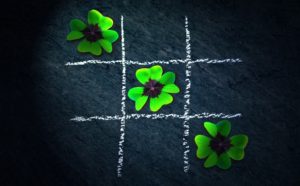 when it comes to losing weight.
when it comes to losing weight.
That may be true and probably not in the way you are imagining.
I have a great deal of experience working with eating and weight. I have studied and conducted research in this area and worked with people struggling with these issues for more years than I would like to admit, first as a Registered Dietitian and then as a Licensed Psychologist.
If you get me started, you will quickly realize the depth of my passion on the topic of dieting and the harm that it brings.
Yep, you read that right – the harm that comes from trying to lose weight.
Did you know that a good predictor of future weight gain is a history of dieting?
That’s right – those who have dieted are likely to weigh more in the future as compared with those who haven’t dieted.
Did you know that eating disorders are highly correlated with a history of restricted eating or dieting?
Or that weight cycling (losing and regaining), may be more damaging to health than being overweight?
I feel so worried about the pressure that is being put upon people to lose weight and all the emotional, as well as physical, damage that the pursuit of thinness leaves in its wake.
I have sat with countless people over the years who have tried, repeatedly, to lose weight and who, by the time I see them, have ended up
- depressed
- anxious,
- obsessive,
- hopeless
- or with an eating disorder.
Not one of them has felt confident or acceptable, despite being highly accomplished in their life.
I cannot put into words the depth of my sadness around this.
If you have regained your weight, you are not alone. Most people regain the weight they have lost when dieting! There is so much marketing touting success stories that it is hard for people to see regain as anything but a personal failure.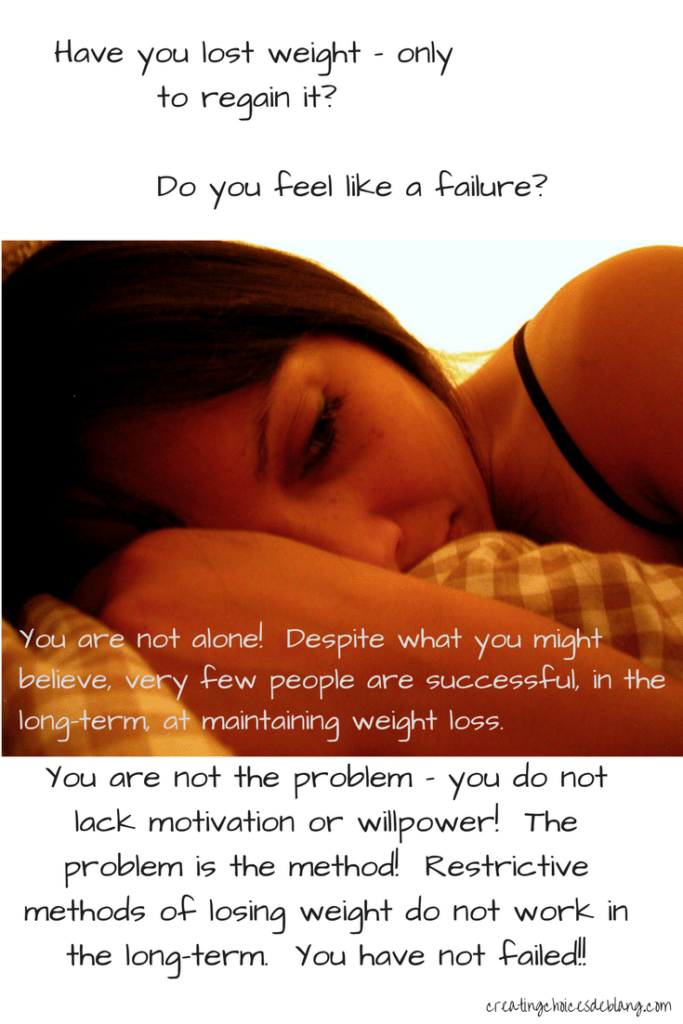
In reality, research shows that the majority of people who lose weight don’t maintain the weight they lost. Instead, they regain it. It is not a personal failure but the norm. The statistics for long-term maintenance of weight loss are pretty dismal 3-5%. Some might say 10%, and even that is not a high percentage.
Would you sign up for a program, of any type, with a 10% chance of long-term success? I don’t think so.
And, a percentage of those successful individuals could be diagnosed with an eating disorder because of the type of control and obsessive behavior it takes to maintain their weight loss.
Most people believe that losing weight is easy and is the result of a simple formula related to calories in and calories used.
It is much more complicated than that. Every day we learn more about the multiple impacts on our desire to eat as well as how calories are absorbed and used, once inside our bodies. 
Even the type of bacteria you have in your gut may influence your food choices as well as how many calories you absorb and use.
Two people eating the same diet with different gut flora may absorb different amounts of calories from that same food.
What is most important to understand is that:
the body is designed to defend against weight loss.
There are multiple systems within the body to maintain weight and guard against weight loss. It is only recently that food has become readily available. These systems were essential or we would not have survived as a species.
The body/brain interprets restrictions in food intake as famine 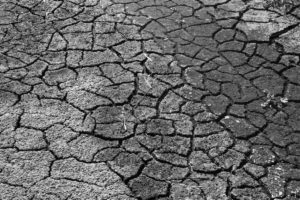 and works hard to get you to eat more food to compensate for that time of famine and to be prepared for the next famine – by adding some extra pounds.
and works hard to get you to eat more food to compensate for that time of famine and to be prepared for the next famine – by adding some extra pounds.
The body doesn’t know that you planned to restrict calories –
it only knows there were less of them and interpreted this as a famine.
Most dieters believe the overeating that occurs after dieting is their fault and describe themselves as emotional eaters. This may be partially true as restriction affects our psyche as well as our physiology. What we can’t have does become all the more enticing!
What is most often overlooked, however, is the body’s weight regulatory systems and how many checks and balances are devoted to maintaining our weight.
We often neglect to consider how strong a force the body is in determining how much we eat, as well as our size.
Because the power of the body is overlooked, most dieters end up feeling weak and incompetent when they find themselves overeating when they were trying to eat less.
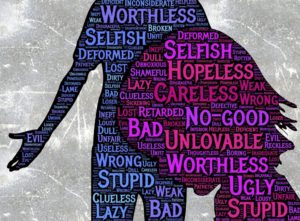 This feeling of failure often expands to incorporate all areas of a person’s life.
This feeling of failure often expands to incorporate all areas of a person’s life.
I sit with people on a daily basis who are smart, capable, loving, and successful who believe that they are a failure because they can’t lose weight.
I know you want to lose weight. By listening to my clients, I understand how painful it can be to live in our weightist culture in a body that doesn’t fit our thin ideals.
I have listened with anger and guilt as I hear stories of weight discrimination and prejudice.
Through the experiences of my clients, I have some understanding of how hard it is to be fat and live in a thin-privileged society.
Please know that I understand that you feel a great deal of pressure to lose weight and desperately want to do so.
I wish that I had a magic pill that would help all of us look like those airbrushed models that the media puts forth as normal. Even before air-brushing, models represented only 1-3% of the population. They would have been the outliers or the abnormal individuals in our population, and that was before air-brushing!
Yet most people believe that is how we should look. In reality, we come in all shapes and sizes. And, in reality, more of us are bigger rather than smaller. I feel curious about whether evolution favors largeness – maybe a topic for another day.
I know you want to fit in – 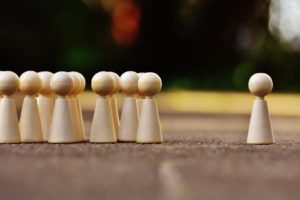 that is so understandable and probably wired into our survival genes.
that is so understandable and probably wired into our survival genes.
I want that for you too.
More than anything I want us to be accepting of the wide diversity of sizes and shapes that make up our population.
And the truth is there is always going to be some way that we don’t fit in or are judged by others. What makes the most difference in the end is
- how we see ourselves
- what we believe is true and
- how we act based on those beliefs.
There was an interesting body image study conducted in which participants were given fake scars on their faces and then asked to pay attention to how people responded to them.
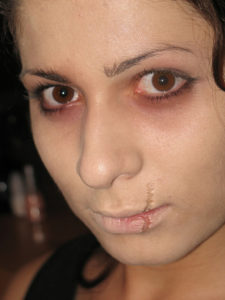 The participants reported negative responses from those who saw their scared faces.
The participants reported negative responses from those who saw their scared faces.
In fact, unbeknownst to them, the scars had been removed before they interacted.
They thought they were receiving final touch ups to their make-up, when in fact, the scars were removed.
They believed that they would receive a negative response and so that is what they experienced.
I know there is size discrimination out there and as a society, we need to work on that.
There is also power in your beliefs.
That is the power and opportunity that I want to nudge you to seize.
If you believe you are unacceptable based on the thin ideals in our culture,
- you will see yourself as unacceptable and
- that is how you will walk through the world and
- that is what you will sense from everyone around you
- whether they are feeling that way or not.
How we feel about ourselves has much more to do with our own thoughts and beliefs than with the size of our pants! Think of someone that you know who is attractive and maybe even thin who doesn’t see themselves in that way.
So here is the good news – you can start working on your body image right now without changing your size.
Remember, what you will see in the mirror is a reflection of your beliefs.
What belief about how you look could you start to change? 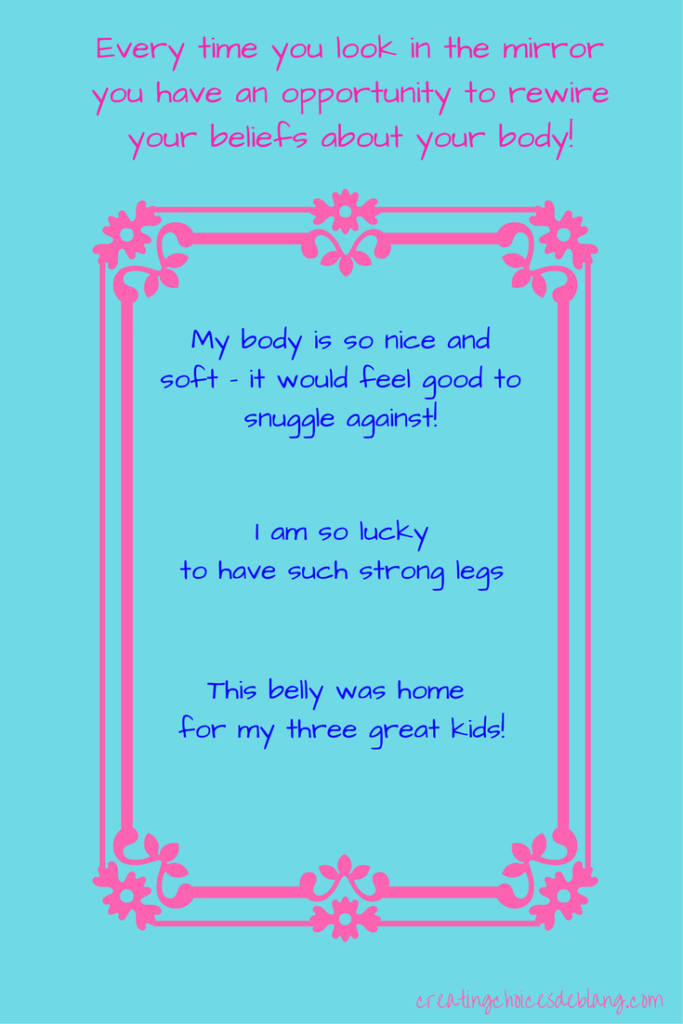
You don’t have to wait until you are thin to begin to love and appreciate your body!
When we love and care for something, we want to take care of it.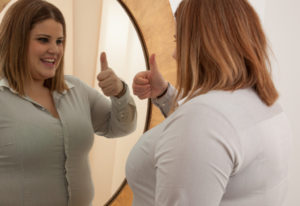
When you despise your body, it is hard to care for it. When we learn to be mindful, compassionate and connected with our needs for self-care, food and eating just seem to fall into place.
It stops being something that I “should do,” and begins to be something that simply feels good.
It changes from a “should” to a “want,” and that changes everything!
When you are mindfully caring for yourself, you will begin to notice how your body feels when you are eating, and when food isn’t really satisfying or feeling good in your body. You will begin to care for your body in new ways that shift the focus away from being “good or bad” when it comes to food.
Kindness and care for yourself and your body’s needs has the best chance of moving your body to its natural set-point and has far less risk of setting off the alarm bells for famine in your body.
Learning to love and appreciate your own body feels good and increases your self-confidence.
It can also decrease your stress levels.
Although you might believe that you have to lose weight in order to be healthy, what is more true is that health is associated with healthy behaviors at every size. For more information on this check out my post on weight and health. Chronic stress, on the other hand, is associated with disease.
So, working on self-acceptance is likely to get your further with your goals for health than constantly stressing about being thinner.
And stress:
- makes it harder to follow through with your long-term goals,
- makes food more rewarding and
- increases the body’s efficiency at storing fat.
So, if you are constantly stressing about your size, it is going to make it harder to care for yourself around food.
I know that it isn’t easy to move to a place of self-acceptance and there are many resources out there to support you.
Seek out the support of those who love and accept you just as you are right now. Do your best to steer clear of those who judge you by your weight.
Search for websites and books that celebrate diversity in size and focus on health versus weight. The Association for Size Diversity (https://sizediversityandhealth.org/) and the Health at Every Size Community (https://haescommunity.com/) are good places to start. I have a number of other resources on my website.
Please just stop blaming yourself. You are not a failure!
Restrictive eating and dieting don’t work.
We were not all meant to be the same size!
See if you can find it in your heart to practice moments of kindness toward yourself and to feel appreciation for all that your body does for you!
Remember…..
The experience of struggling with weight loss can be such an isolating experience. If you know of someone who might benefit from reading this post, please feel free to pass it along! There are share buttons below.
If you would like to receive an announcement of when the next post is published, just sign up at the top of the post and to the right.
Until next time….how might you Flourish in your body?
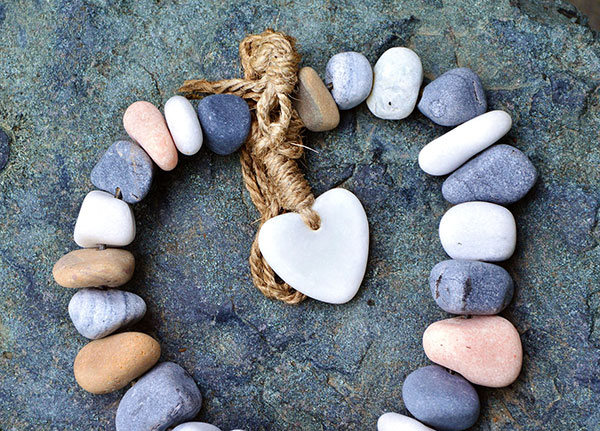
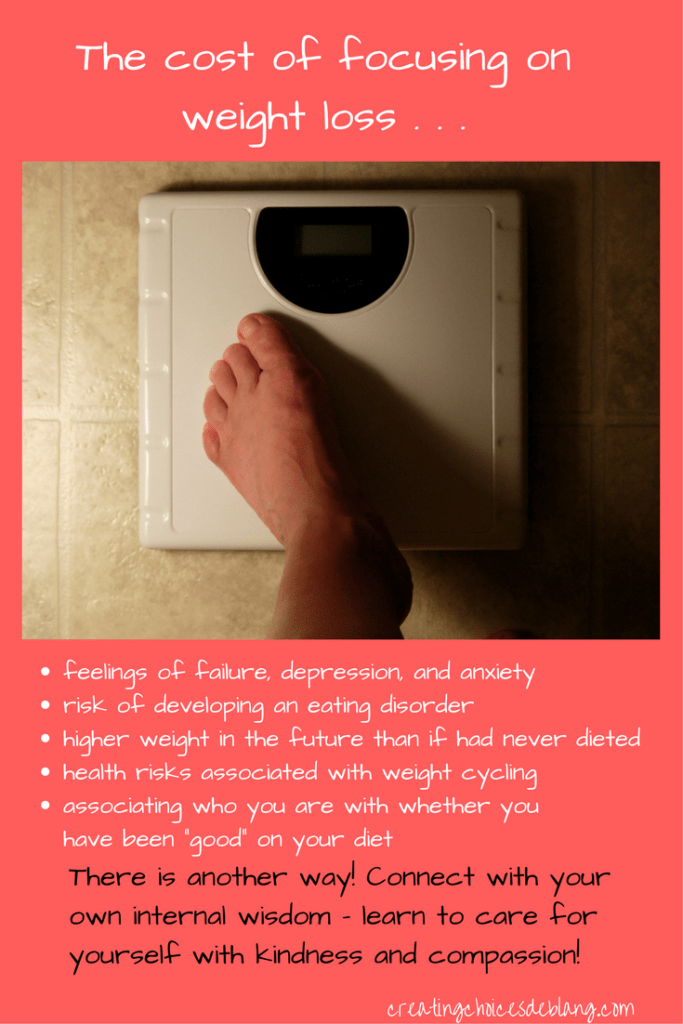
Thank you for this article. I read it and believe what you wrote.
Thanks, Anne. I appreciate your feedback!